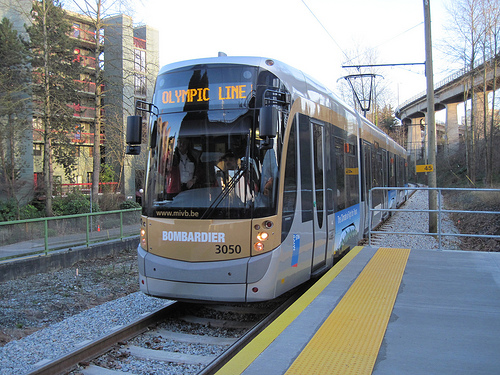Print Edition: November 2, 2011
 Does anybody desire a streetcar, or is it only a streetcar named desire? A good question to begin with, given our recent exposure to them during the 2010 Olympics. But these things are great. They’re green, efficient, quiet, and contemporary – a perfect match for the big city.
Does anybody desire a streetcar, or is it only a streetcar named desire? A good question to begin with, given our recent exposure to them during the 2010 Olympics. But these things are great. They’re green, efficient, quiet, and contemporary – a perfect match for the big city.
The kind used in Vancouver during the Olympics are of the electric variety. Operating as the Olympic Line on the city’s unused historical track, they were brought in for a trial run during the 17-day period, as a loan from the city of Brussels. Built by Bombardier and able to reach speeds of 70-100 km/h, they exhibit a design that showcases a modern day means of transportation. Large windows line the walls, the interior is strikingly elegant, and the ride is smooth. They also sit close to ground level, making it as simple as possible to board. They’re much like a cross between a classic train and the electric buses that travel the streets of Vancouver. These are the type of streetcars that I would love to see become a reality.
Of course, there already is an established Skytrain system. But the two would co-exist in a symbiotic relationship, as they did for the Olympics. The Skytrain has its capacity to transfer passengers for longer distance commutes, and the streetcars take over in a more localized fashion within the city. And should Vancouver actually decide to eliminate the viaducts, making it more difficult to get a car into-and-out-of the city, Science World would be a great commuter hub. Here, those traveling by car and Skytrain would be able to transfer to the streetcar to finish their trip.
And sure, they could currently take the bus, but streetcars are a much more attractive option. Vancouver, after all, is engineering itself into a ‘green’ urban centre and those overhead electrical wires on which the buses travel don’t always go where they need to.
Establishing a streetcar infrastructure isn’t cheap, though. Beginning with the one-time expenses of laying the track and purchasing the cars, the operational and maintenance costs would be ongoing. The Greater Toronto and Hamilton Area’s transport authority has recently signed a deal for 204 streetcars, similar to the ones that were on trial here, for $851-million. And a study by the Seattle Transit Blog had estimated their operating cost to be $187 per hour.
However, the upside is that these streetcars are completely electrical which allows for savings on fuel. As for covering the costs, that would be incorporated in the fare price, or subsidized in some way. But given that more commuters would be abandoning their cars in favour of the system, it would result in a greater economy of scale. And that scale would be furthered enhanced as drivers feel the pinch from both the rising carbon tax, and the additional gas tax for TransLink’s Evergreen expansion.
With all the benefits that the streetcars bring, they’re becoming a very true option many cities. As well as being in Brussels, Toronto and Seattle, they’re also in Portland, San Francisco, New Orleans, London, Rome and Hong Kong, among others.
But what would certainly be nice is the possibility of having a streetcar that stretches from Vancouver all the way out to the UFV Abbotsford campus, or even the Chilliwack campus for that matter. It could be called the University Valley Line and service the community as well as students. UFV is a commuter school and having an option other than driving would give students a more reliable route to class, as well as a transfer along the major corridor to other universities. Further, many of the cars that are in Abbotsford are there as it’s a bedroom community for the Vancouver region. An alternate option would then possibly take a lot of those cars off of the highway and ease congestion. There’s an unused rail line that runs from Abbotsford to Surrey, so why not retrofit that for a streetcar? That might not be the most economical option, but it would be something to service a growing community.
If we’re after a ‘greener’ region, then our politicians should be taking a serious look at streetcars as a viable option. And with civic elections heating up, this is a great issue to be jumping on.


